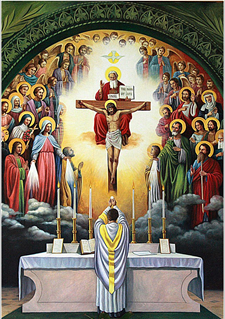For the liturgy, “through which the work of our redemption is accomplished,” most of all in the divine sacrifice of the Eucharist, is the outstanding means whereby the faithful may express in their lives, and manifest to others, the mystery of Christ and the real nature of the true Church. It is of the essence of the Church that she be both human and divine, visible and yet invisibly equipped, eager to act and yet intent on contemplation, present in this world and yet not at home in it; and she is all these things in such wise that in her the human is directed and subordinated to the divine, the visible likewise to the invisible, action to contemplation, and this present world to that city yet to come, which we seek. While the liturgy daily builds up those who are within into a holy temple of the Lord, into a dwelling place for God in the Spirit, to the mature measure of the fullness of Christ, at the same time it marvelously strengthens their power to preach Christ, and thus shows forth the Church to those who are outside as a sign lifted up among the nations under which the scattered children of God may be gathered together, until there is one sheepfold and one shepherd. The liturgy is the summit toward which the activity of the Church is directed; at the same time it is the font from which all her power flows. For the aim and object of apostolic works is that all who are made sons of God by faith and baptism should come together to praise God in the midst of His Church, to take part in the sacrifice, and to eat the Lord’s supper. God who “wills that all men be saved and come to the knowledge of the truth” (1 Tim. 2:4), “who in many and various ways spoke in times past to the fathers by the prophets” (Heb. 1:1). For His humanity, united with the person of the Word, was the instrument of our salvation. Therefore in Christ “the perfect achievement of our reconciliation came forth, and the fullness of divine worship was given to us.” The liturgy in its turn moves the faithful, filled with “the paschal sacraments,” to be “one in holiness”; it prays that “they may hold fast in their lives to what they have grasped by their faith”; the renewal in the Eucharist of the covenant between the Lord and man draws the faithful into the compelling love of Christ and sets them on fire. From the liturgy, therefore, and especially from the Eucharist, as from a font, grace is poured forth upon us; and the sanctification of men in Christ and the glorification of God, to which all other activities of the Church are directed as toward their end, is achieved in the most efficacious possible way.


